Electronic Health Records: Policy and Ethics Considerations
VerifiedAdded on 2021/04/17
|10
|2906
|136
AI Summary
The provided assignment focuses on the critical aspects of electronic health records (EHRs), including their development, implementation, and impact on healthcare. It delves into policy considerations such as protecting patient privacy, confidentiality, and setting standards for EHR systems. The assignment also touches upon ethical issues related to EHR adoption and usage in dental care and other healthcare settings. By examining these topics, students can gain a comprehensive understanding of the complexities surrounding EHRs and their influence on healthcare quality and safety.
Contribute Materials
Your contribution can guide someone’s learning journey. Share your
documents today.
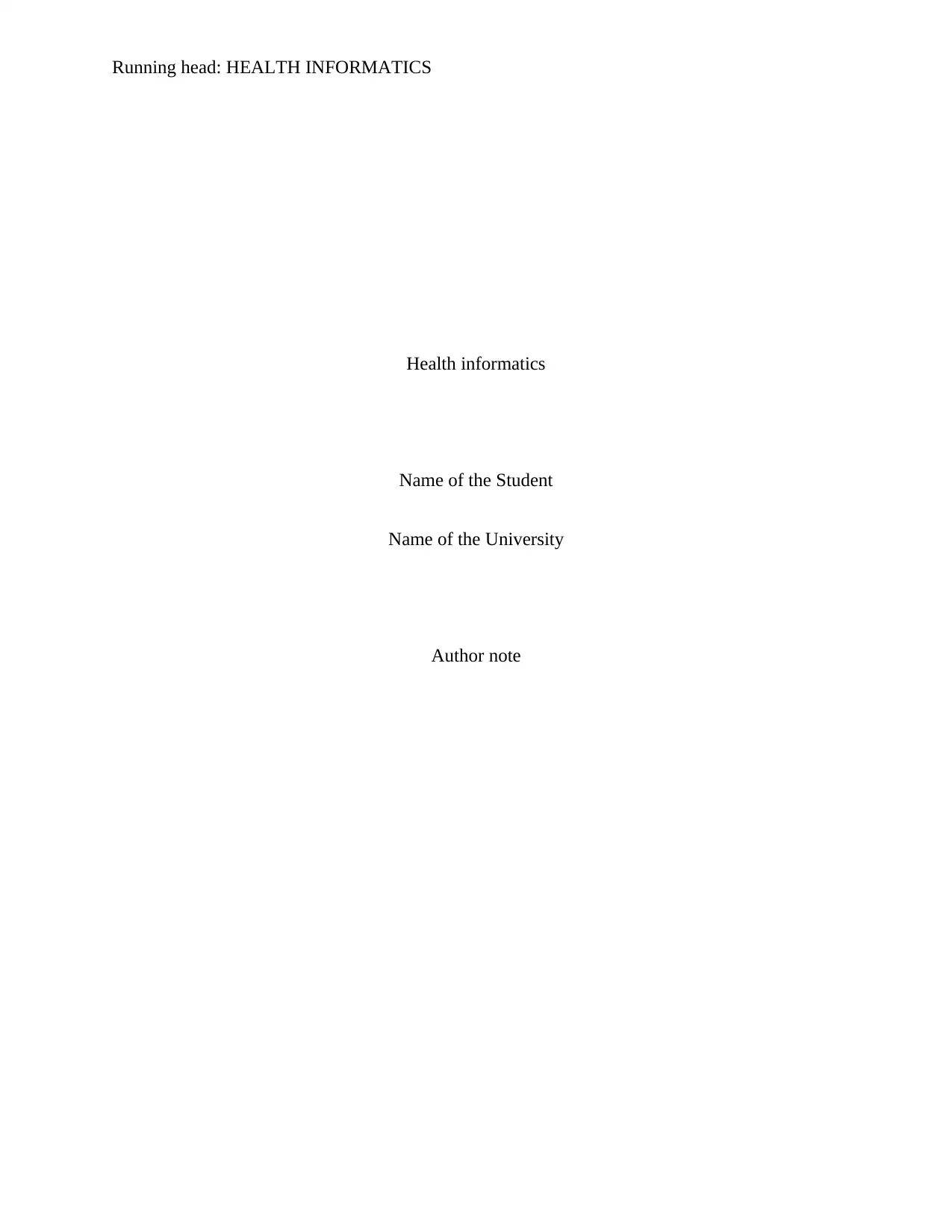
Running head: HEALTH INFORMATICS
Health informatics
Name of the Student
Name of the University
Author note
Health informatics
Name of the Student
Name of the University
Author note
Secure Best Marks with AI Grader
Need help grading? Try our AI Grader for instant feedback on your assignments.
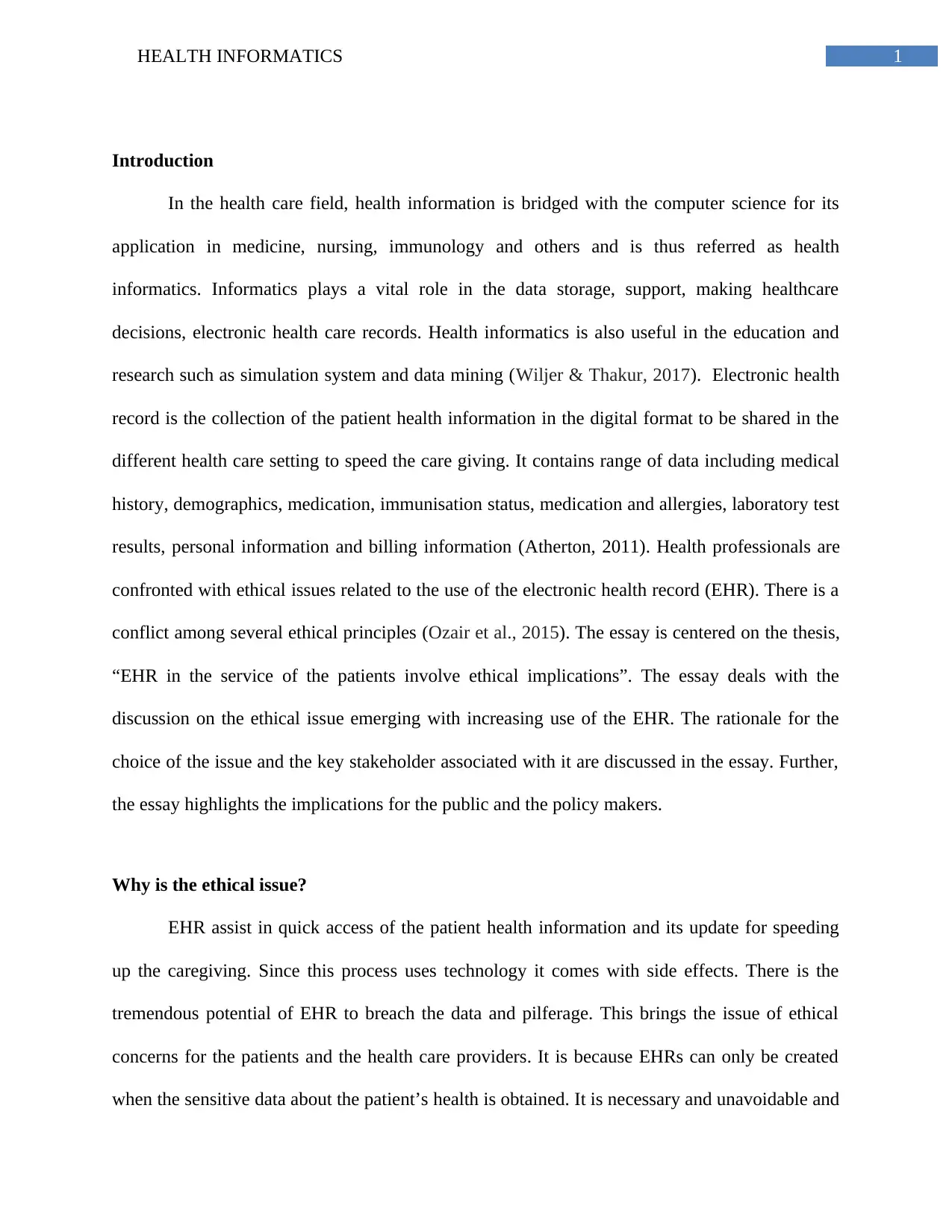
1HEALTH INFORMATICS
Introduction
In the health care field, health information is bridged with the computer science for its
application in medicine, nursing, immunology and others and is thus referred as health
informatics. Informatics plays a vital role in the data storage, support, making healthcare
decisions, electronic health care records. Health informatics is also useful in the education and
research such as simulation system and data mining (Wiljer & Thakur, 2017). Electronic health
record is the collection of the patient health information in the digital format to be shared in the
different health care setting to speed the care giving. It contains range of data including medical
history, demographics, medication, immunisation status, medication and allergies, laboratory test
results, personal information and billing information (Atherton, 2011). Health professionals are
confronted with ethical issues related to the use of the electronic health record (EHR). There is a
conflict among several ethical principles (Ozair et al., 2015). The essay is centered on the thesis,
“EHR in the service of the patients involve ethical implications”. The essay deals with the
discussion on the ethical issue emerging with increasing use of the EHR. The rationale for the
choice of the issue and the key stakeholder associated with it are discussed in the essay. Further,
the essay highlights the implications for the public and the policy makers.
Why is the ethical issue?
EHR assist in quick access of the patient health information and its update for speeding
up the caregiving. Since this process uses technology it comes with side effects. There is the
tremendous potential of EHR to breach the data and pilferage. This brings the issue of ethical
concerns for the patients and the health care providers. It is because EHRs can only be created
when the sensitive data about the patient’s health is obtained. It is necessary and unavoidable and
Introduction
In the health care field, health information is bridged with the computer science for its
application in medicine, nursing, immunology and others and is thus referred as health
informatics. Informatics plays a vital role in the data storage, support, making healthcare
decisions, electronic health care records. Health informatics is also useful in the education and
research such as simulation system and data mining (Wiljer & Thakur, 2017). Electronic health
record is the collection of the patient health information in the digital format to be shared in the
different health care setting to speed the care giving. It contains range of data including medical
history, demographics, medication, immunisation status, medication and allergies, laboratory test
results, personal information and billing information (Atherton, 2011). Health professionals are
confronted with ethical issues related to the use of the electronic health record (EHR). There is a
conflict among several ethical principles (Ozair et al., 2015). The essay is centered on the thesis,
“EHR in the service of the patients involve ethical implications”. The essay deals with the
discussion on the ethical issue emerging with increasing use of the EHR. The rationale for the
choice of the issue and the key stakeholder associated with it are discussed in the essay. Further,
the essay highlights the implications for the public and the policy makers.
Why is the ethical issue?
EHR assist in quick access of the patient health information and its update for speeding
up the caregiving. Since this process uses technology it comes with side effects. There is the
tremendous potential of EHR to breach the data and pilferage. This brings the issue of ethical
concerns for the patients and the health care providers. It is because EHRs can only be created
when the sensitive data about the patient’s health is obtained. It is necessary and unavoidable and
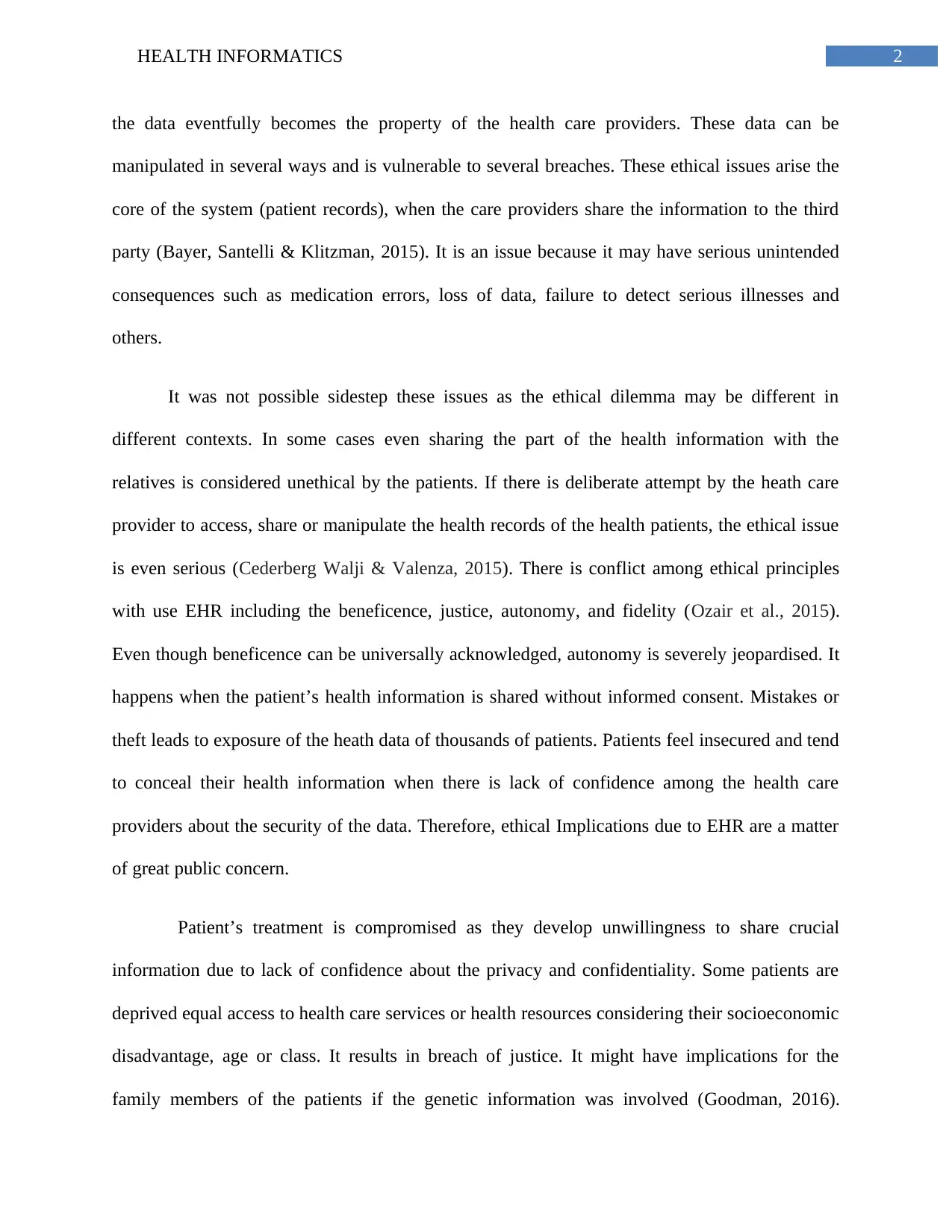
2HEALTH INFORMATICS
the data eventfully becomes the property of the health care providers. These data can be
manipulated in several ways and is vulnerable to several breaches. These ethical issues arise the
core of the system (patient records), when the care providers share the information to the third
party (Bayer, Santelli & Klitzman, 2015). It is an issue because it may have serious unintended
consequences such as medication errors, loss of data, failure to detect serious illnesses and
others.
It was not possible sidestep these issues as the ethical dilemma may be different in
different contexts. In some cases even sharing the part of the health information with the
relatives is considered unethical by the patients. If there is deliberate attempt by the heath care
provider to access, share or manipulate the health records of the health patients, the ethical issue
is even serious (Cederberg Walji & Valenza, 2015). There is conflict among ethical principles
with use EHR including the beneficence, justice, autonomy, and fidelity (Ozair et al., 2015).
Even though beneficence can be universally acknowledged, autonomy is severely jeopardised. It
happens when the patient’s health information is shared without informed consent. Mistakes or
theft leads to exposure of the heath data of thousands of patients. Patients feel insecured and tend
to conceal their health information when there is lack of confidence among the health care
providers about the security of the data. Therefore, ethical Implications due to EHR are a matter
of great public concern.
Patient’s treatment is compromised as they develop unwillingness to share crucial
information due to lack of confidence about the privacy and confidentiality. Some patients are
deprived equal access to health care services or health resources considering their socioeconomic
disadvantage, age or class. It results in breach of justice. It might have implications for the
family members of the patients if the genetic information was involved (Goodman, 2016).
the data eventfully becomes the property of the health care providers. These data can be
manipulated in several ways and is vulnerable to several breaches. These ethical issues arise the
core of the system (patient records), when the care providers share the information to the third
party (Bayer, Santelli & Klitzman, 2015). It is an issue because it may have serious unintended
consequences such as medication errors, loss of data, failure to detect serious illnesses and
others.
It was not possible sidestep these issues as the ethical dilemma may be different in
different contexts. In some cases even sharing the part of the health information with the
relatives is considered unethical by the patients. If there is deliberate attempt by the heath care
provider to access, share or manipulate the health records of the health patients, the ethical issue
is even serious (Cederberg Walji & Valenza, 2015). There is conflict among ethical principles
with use EHR including the beneficence, justice, autonomy, and fidelity (Ozair et al., 2015).
Even though beneficence can be universally acknowledged, autonomy is severely jeopardised. It
happens when the patient’s health information is shared without informed consent. Mistakes or
theft leads to exposure of the heath data of thousands of patients. Patients feel insecured and tend
to conceal their health information when there is lack of confidence among the health care
providers about the security of the data. Therefore, ethical Implications due to EHR are a matter
of great public concern.
Patient’s treatment is compromised as they develop unwillingness to share crucial
information due to lack of confidence about the privacy and confidentiality. Some patients are
deprived equal access to health care services or health resources considering their socioeconomic
disadvantage, age or class. It results in breach of justice. It might have implications for the
family members of the patients if the genetic information was involved (Goodman, 2016).
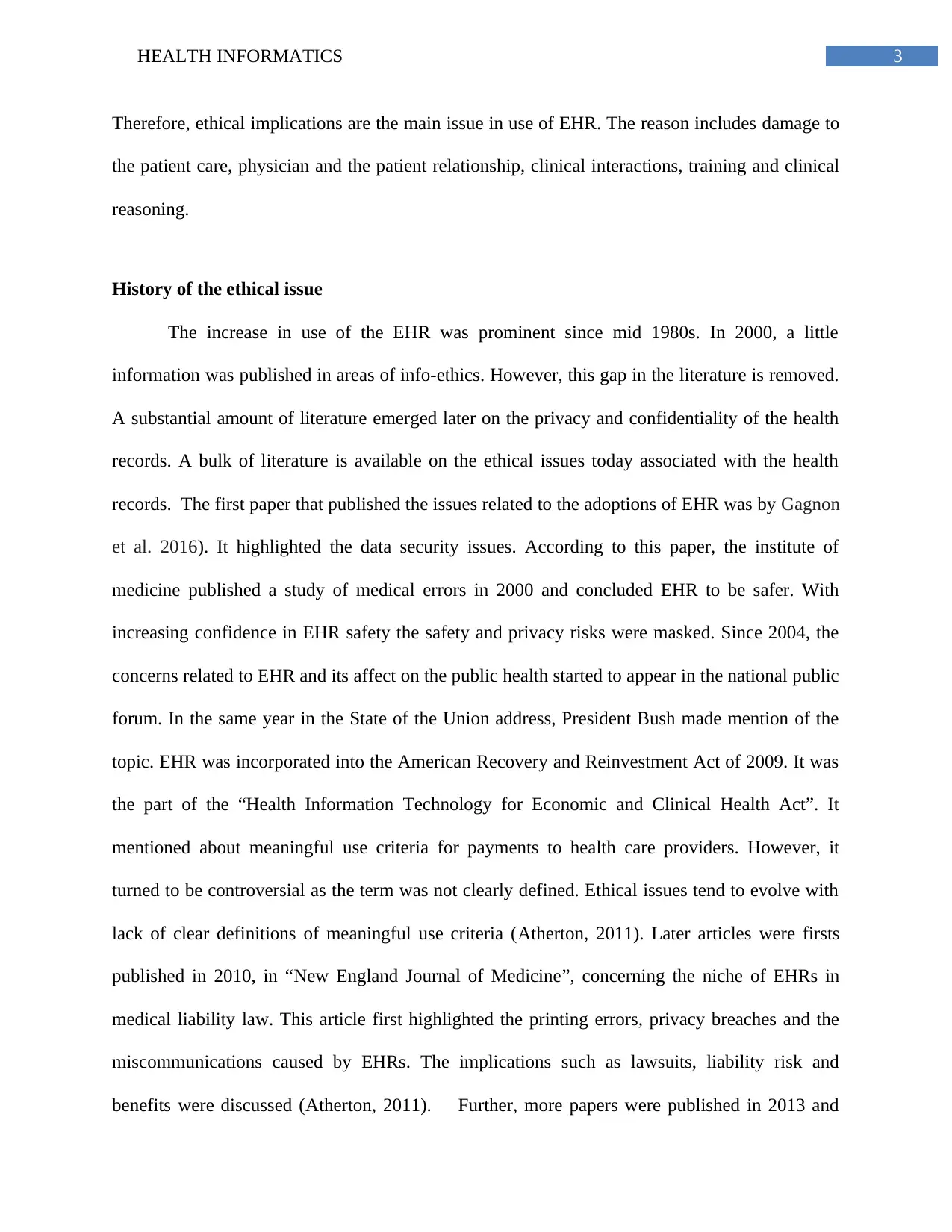
3HEALTH INFORMATICS
Therefore, ethical implications are the main issue in use of EHR. The reason includes damage to
the patient care, physician and the patient relationship, clinical interactions, training and clinical
reasoning.
History of the ethical issue
The increase in use of the EHR was prominent since mid 1980s. In 2000, a little
information was published in areas of info-ethics. However, this gap in the literature is removed.
A substantial amount of literature emerged later on the privacy and confidentiality of the health
records. A bulk of literature is available on the ethical issues today associated with the health
records. The first paper that published the issues related to the adoptions of EHR was by Gagnon
et al. 2016). It highlighted the data security issues. According to this paper, the institute of
medicine published a study of medical errors in 2000 and concluded EHR to be safer. With
increasing confidence in EHR safety the safety and privacy risks were masked. Since 2004, the
concerns related to EHR and its affect on the public health started to appear in the national public
forum. In the same year in the State of the Union address, President Bush made mention of the
topic. EHR was incorporated into the American Recovery and Reinvestment Act of 2009. It was
the part of the “Health Information Technology for Economic and Clinical Health Act”. It
mentioned about meaningful use criteria for payments to health care providers. However, it
turned to be controversial as the term was not clearly defined. Ethical issues tend to evolve with
lack of clear definitions of meaningful use criteria (Atherton, 2011). Later articles were firsts
published in 2010, in “New England Journal of Medicine”, concerning the niche of EHRs in
medical liability law. This article first highlighted the printing errors, privacy breaches and the
miscommunications caused by EHRs. The implications such as lawsuits, liability risk and
benefits were discussed (Atherton, 2011). Further, more papers were published in 2013 and
Therefore, ethical implications are the main issue in use of EHR. The reason includes damage to
the patient care, physician and the patient relationship, clinical interactions, training and clinical
reasoning.
History of the ethical issue
The increase in use of the EHR was prominent since mid 1980s. In 2000, a little
information was published in areas of info-ethics. However, this gap in the literature is removed.
A substantial amount of literature emerged later on the privacy and confidentiality of the health
records. A bulk of literature is available on the ethical issues today associated with the health
records. The first paper that published the issues related to the adoptions of EHR was by Gagnon
et al. 2016). It highlighted the data security issues. According to this paper, the institute of
medicine published a study of medical errors in 2000 and concluded EHR to be safer. With
increasing confidence in EHR safety the safety and privacy risks were masked. Since 2004, the
concerns related to EHR and its affect on the public health started to appear in the national public
forum. In the same year in the State of the Union address, President Bush made mention of the
topic. EHR was incorporated into the American Recovery and Reinvestment Act of 2009. It was
the part of the “Health Information Technology for Economic and Clinical Health Act”. It
mentioned about meaningful use criteria for payments to health care providers. However, it
turned to be controversial as the term was not clearly defined. Ethical issues tend to evolve with
lack of clear definitions of meaningful use criteria (Atherton, 2011). Later articles were firsts
published in 2010, in “New England Journal of Medicine”, concerning the niche of EHRs in
medical liability law. This article first highlighted the printing errors, privacy breaches and the
miscommunications caused by EHRs. The implications such as lawsuits, liability risk and
benefits were discussed (Atherton, 2011). Further, more papers were published in 2013 and
Secure Best Marks with AI Grader
Need help grading? Try our AI Grader for instant feedback on your assignments.
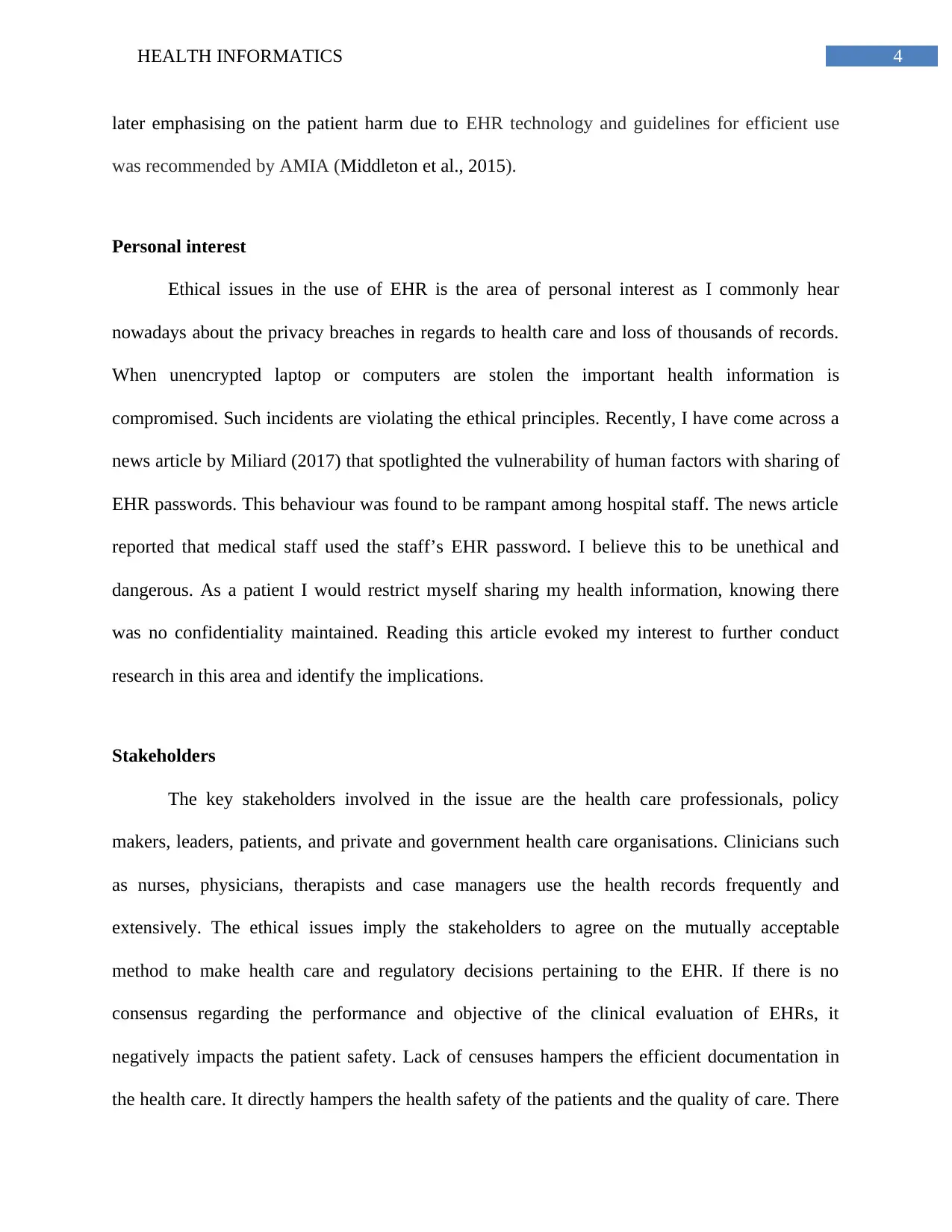
4HEALTH INFORMATICS
later emphasising on the patient harm due to EHR technology and guidelines for efficient use
was recommended by AMIA (Middleton et al., 2015).
Personal interest
Ethical issues in the use of EHR is the area of personal interest as I commonly hear
nowadays about the privacy breaches in regards to health care and loss of thousands of records.
When unencrypted laptop or computers are stolen the important health information is
compromised. Such incidents are violating the ethical principles. Recently, I have come across a
news article by Miliard (2017) that spotlighted the vulnerability of human factors with sharing of
EHR passwords. This behaviour was found to be rampant among hospital staff. The news article
reported that medical staff used the staff’s EHR password. I believe this to be unethical and
dangerous. As a patient I would restrict myself sharing my health information, knowing there
was no confidentiality maintained. Reading this article evoked my interest to further conduct
research in this area and identify the implications.
Stakeholders
The key stakeholders involved in the issue are the health care professionals, policy
makers, leaders, patients, and private and government health care organisations. Clinicians such
as nurses, physicians, therapists and case managers use the health records frequently and
extensively. The ethical issues imply the stakeholders to agree on the mutually acceptable
method to make health care and regulatory decisions pertaining to the EHR. If there is no
consensus regarding the performance and objective of the clinical evaluation of EHRs, it
negatively impacts the patient safety. Lack of censuses hampers the efficient documentation in
the health care. It directly hampers the health safety of the patients and the quality of care. There
later emphasising on the patient harm due to EHR technology and guidelines for efficient use
was recommended by AMIA (Middleton et al., 2015).
Personal interest
Ethical issues in the use of EHR is the area of personal interest as I commonly hear
nowadays about the privacy breaches in regards to health care and loss of thousands of records.
When unencrypted laptop or computers are stolen the important health information is
compromised. Such incidents are violating the ethical principles. Recently, I have come across a
news article by Miliard (2017) that spotlighted the vulnerability of human factors with sharing of
EHR passwords. This behaviour was found to be rampant among hospital staff. The news article
reported that medical staff used the staff’s EHR password. I believe this to be unethical and
dangerous. As a patient I would restrict myself sharing my health information, knowing there
was no confidentiality maintained. Reading this article evoked my interest to further conduct
research in this area and identify the implications.
Stakeholders
The key stakeholders involved in the issue are the health care professionals, policy
makers, leaders, patients, and private and government health care organisations. Clinicians such
as nurses, physicians, therapists and case managers use the health records frequently and
extensively. The ethical issues imply the stakeholders to agree on the mutually acceptable
method to make health care and regulatory decisions pertaining to the EHR. If there is no
consensus regarding the performance and objective of the clinical evaluation of EHRs, it
negatively impacts the patient safety. Lack of censuses hampers the efficient documentation in
the health care. It directly hampers the health safety of the patients and the quality of care. There
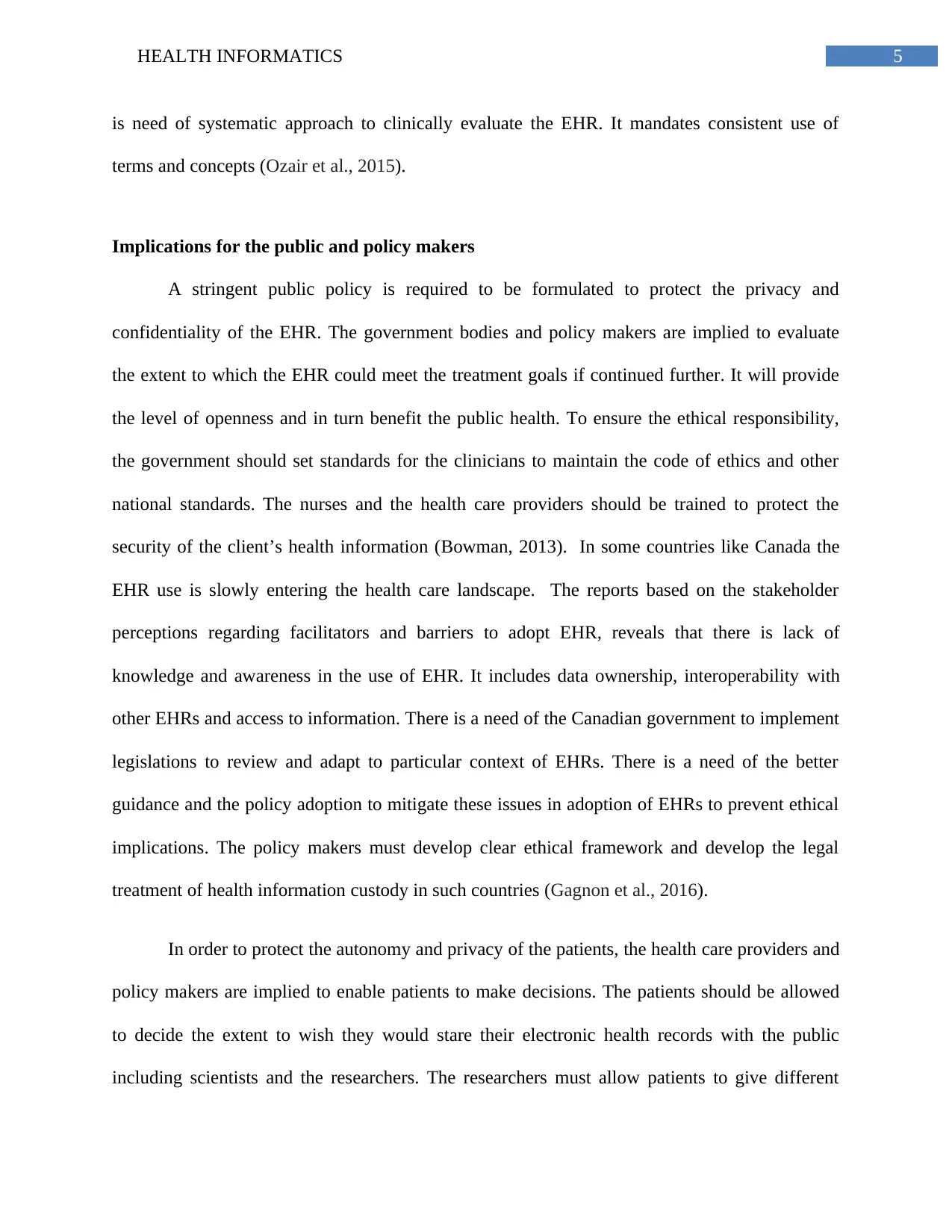
5HEALTH INFORMATICS
is need of systematic approach to clinically evaluate the EHR. It mandates consistent use of
terms and concepts (Ozair et al., 2015).
Implications for the public and policy makers
A stringent public policy is required to be formulated to protect the privacy and
confidentiality of the EHR. The government bodies and policy makers are implied to evaluate
the extent to which the EHR could meet the treatment goals if continued further. It will provide
the level of openness and in turn benefit the public health. To ensure the ethical responsibility,
the government should set standards for the clinicians to maintain the code of ethics and other
national standards. The nurses and the health care providers should be trained to protect the
security of the client’s health information (Bowman, 2013). In some countries like Canada the
EHR use is slowly entering the health care landscape. The reports based on the stakeholder
perceptions regarding facilitators and barriers to adopt EHR, reveals that there is lack of
knowledge and awareness in the use of EHR. It includes data ownership, interoperability with
other EHRs and access to information. There is a need of the Canadian government to implement
legislations to review and adapt to particular context of EHRs. There is a need of the better
guidance and the policy adoption to mitigate these issues in adoption of EHRs to prevent ethical
implications. The policy makers must develop clear ethical framework and develop the legal
treatment of health information custody in such countries (Gagnon et al., 2016).
In order to protect the autonomy and privacy of the patients, the health care providers and
policy makers are implied to enable patients to make decisions. The patients should be allowed
to decide the extent to wish they would stare their electronic health records with the public
including scientists and the researchers. The researchers must allow patients to give different
is need of systematic approach to clinically evaluate the EHR. It mandates consistent use of
terms and concepts (Ozair et al., 2015).
Implications for the public and policy makers
A stringent public policy is required to be formulated to protect the privacy and
confidentiality of the EHR. The government bodies and policy makers are implied to evaluate
the extent to which the EHR could meet the treatment goals if continued further. It will provide
the level of openness and in turn benefit the public health. To ensure the ethical responsibility,
the government should set standards for the clinicians to maintain the code of ethics and other
national standards. The nurses and the health care providers should be trained to protect the
security of the client’s health information (Bowman, 2013). In some countries like Canada the
EHR use is slowly entering the health care landscape. The reports based on the stakeholder
perceptions regarding facilitators and barriers to adopt EHR, reveals that there is lack of
knowledge and awareness in the use of EHR. It includes data ownership, interoperability with
other EHRs and access to information. There is a need of the Canadian government to implement
legislations to review and adapt to particular context of EHRs. There is a need of the better
guidance and the policy adoption to mitigate these issues in adoption of EHRs to prevent ethical
implications. The policy makers must develop clear ethical framework and develop the legal
treatment of health information custody in such countries (Gagnon et al., 2016).
In order to protect the autonomy and privacy of the patients, the health care providers and
policy makers are implied to enable patients to make decisions. The patients should be allowed
to decide the extent to wish they would stare their electronic health records with the public
including scientists and the researchers. The researchers must allow patients to give different
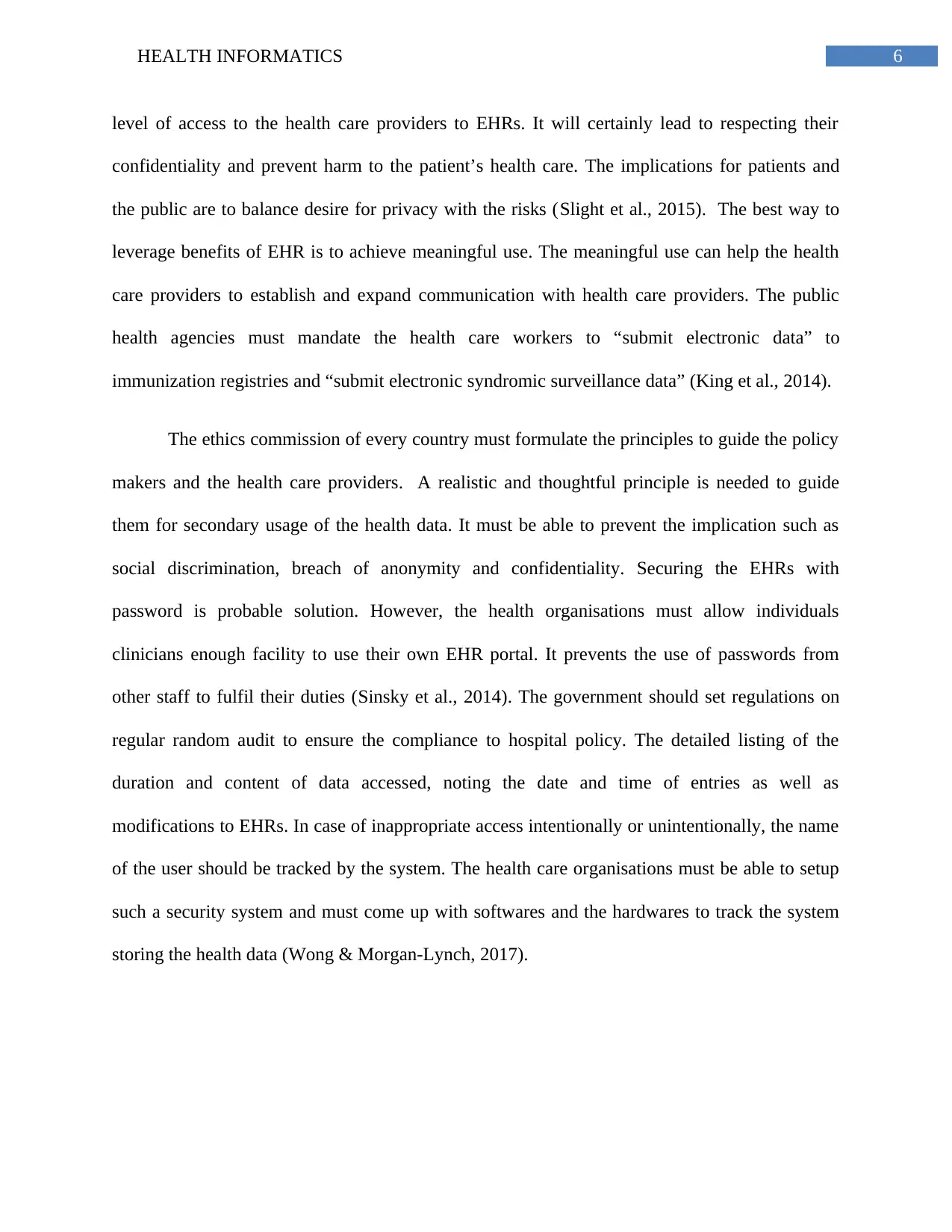
6HEALTH INFORMATICS
level of access to the health care providers to EHRs. It will certainly lead to respecting their
confidentiality and prevent harm to the patient’s health care. The implications for patients and
the public are to balance desire for privacy with the risks (Slight et al., 2015). The best way to
leverage benefits of EHR is to achieve meaningful use. The meaningful use can help the health
care providers to establish and expand communication with health care providers. The public
health agencies must mandate the health care workers to “submit electronic data” to
immunization registries and “submit electronic syndromic surveillance data” (King et al., 2014).
The ethics commission of every country must formulate the principles to guide the policy
makers and the health care providers. A realistic and thoughtful principle is needed to guide
them for secondary usage of the health data. It must be able to prevent the implication such as
social discrimination, breach of anonymity and confidentiality. Securing the EHRs with
password is probable solution. However, the health organisations must allow individuals
clinicians enough facility to use their own EHR portal. It prevents the use of passwords from
other staff to fulfil their duties (Sinsky et al., 2014). The government should set regulations on
regular random audit to ensure the compliance to hospital policy. The detailed listing of the
duration and content of data accessed, noting the date and time of entries as well as
modifications to EHRs. In case of inappropriate access intentionally or unintentionally, the name
of the user should be tracked by the system. The health care organisations must be able to setup
such a security system and must come up with softwares and the hardwares to track the system
storing the health data (Wong & Morgan-Lynch, 2017).
level of access to the health care providers to EHRs. It will certainly lead to respecting their
confidentiality and prevent harm to the patient’s health care. The implications for patients and
the public are to balance desire for privacy with the risks (Slight et al., 2015). The best way to
leverage benefits of EHR is to achieve meaningful use. The meaningful use can help the health
care providers to establish and expand communication with health care providers. The public
health agencies must mandate the health care workers to “submit electronic data” to
immunization registries and “submit electronic syndromic surveillance data” (King et al., 2014).
The ethics commission of every country must formulate the principles to guide the policy
makers and the health care providers. A realistic and thoughtful principle is needed to guide
them for secondary usage of the health data. It must be able to prevent the implication such as
social discrimination, breach of anonymity and confidentiality. Securing the EHRs with
password is probable solution. However, the health organisations must allow individuals
clinicians enough facility to use their own EHR portal. It prevents the use of passwords from
other staff to fulfil their duties (Sinsky et al., 2014). The government should set regulations on
regular random audit to ensure the compliance to hospital policy. The detailed listing of the
duration and content of data accessed, noting the date and time of entries as well as
modifications to EHRs. In case of inappropriate access intentionally or unintentionally, the name
of the user should be tracked by the system. The health care organisations must be able to setup
such a security system and must come up with softwares and the hardwares to track the system
storing the health data (Wong & Morgan-Lynch, 2017).
Paraphrase This Document
Need a fresh take? Get an instant paraphrase of this document with our AI Paraphraser
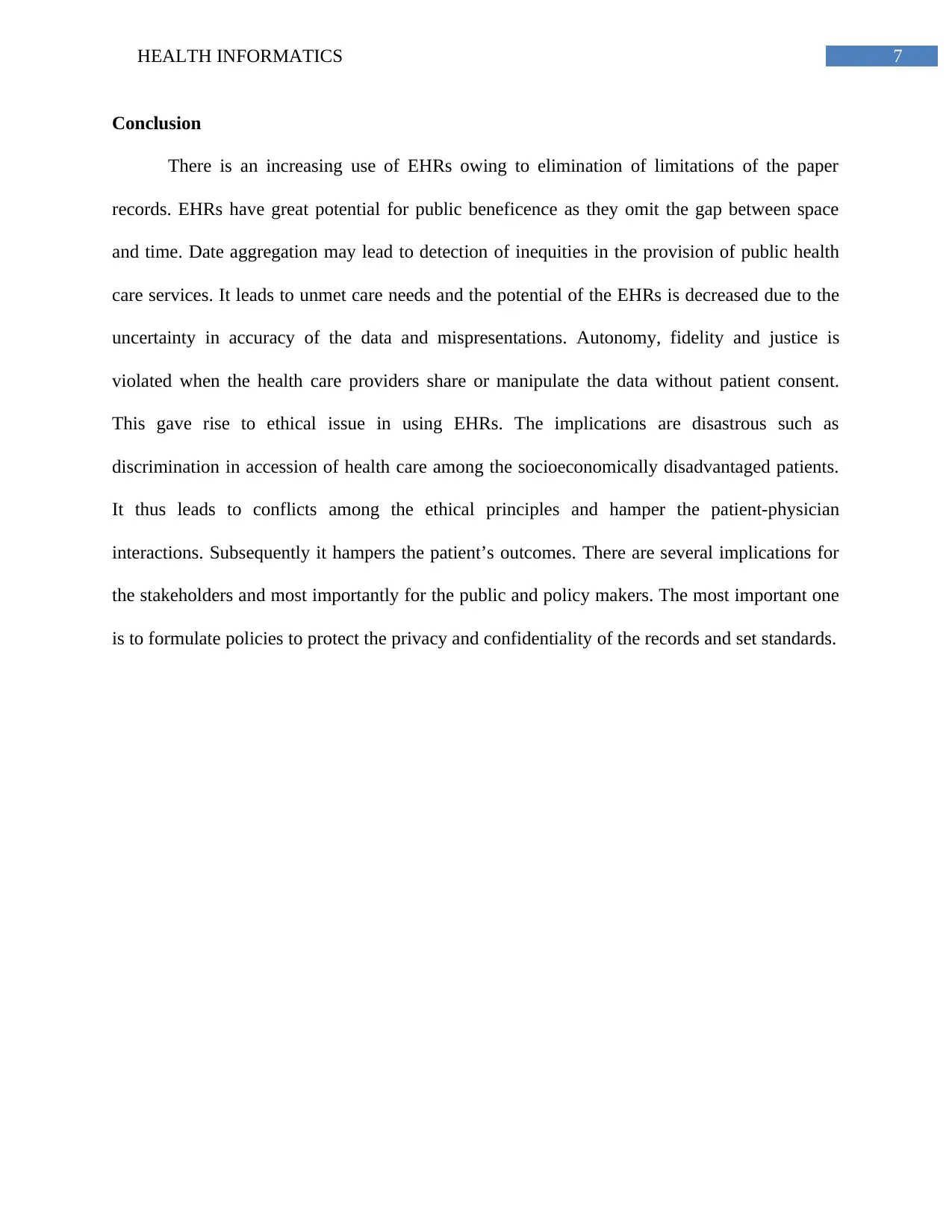
7HEALTH INFORMATICS
Conclusion
There is an increasing use of EHRs owing to elimination of limitations of the paper
records. EHRs have great potential for public beneficence as they omit the gap between space
and time. Date aggregation may lead to detection of inequities in the provision of public health
care services. It leads to unmet care needs and the potential of the EHRs is decreased due to the
uncertainty in accuracy of the data and mispresentations. Autonomy, fidelity and justice is
violated when the health care providers share or manipulate the data without patient consent.
This gave rise to ethical issue in using EHRs. The implications are disastrous such as
discrimination in accession of health care among the socioeconomically disadvantaged patients.
It thus leads to conflicts among the ethical principles and hamper the patient-physician
interactions. Subsequently it hampers the patient’s outcomes. There are several implications for
the stakeholders and most importantly for the public and policy makers. The most important one
is to formulate policies to protect the privacy and confidentiality of the records and set standards.
Conclusion
There is an increasing use of EHRs owing to elimination of limitations of the paper
records. EHRs have great potential for public beneficence as they omit the gap between space
and time. Date aggregation may lead to detection of inequities in the provision of public health
care services. It leads to unmet care needs and the potential of the EHRs is decreased due to the
uncertainty in accuracy of the data and mispresentations. Autonomy, fidelity and justice is
violated when the health care providers share or manipulate the data without patient consent.
This gave rise to ethical issue in using EHRs. The implications are disastrous such as
discrimination in accession of health care among the socioeconomically disadvantaged patients.
It thus leads to conflicts among the ethical principles and hamper the patient-physician
interactions. Subsequently it hampers the patient’s outcomes. There are several implications for
the stakeholders and most importantly for the public and policy makers. The most important one
is to formulate policies to protect the privacy and confidentiality of the records and set standards.
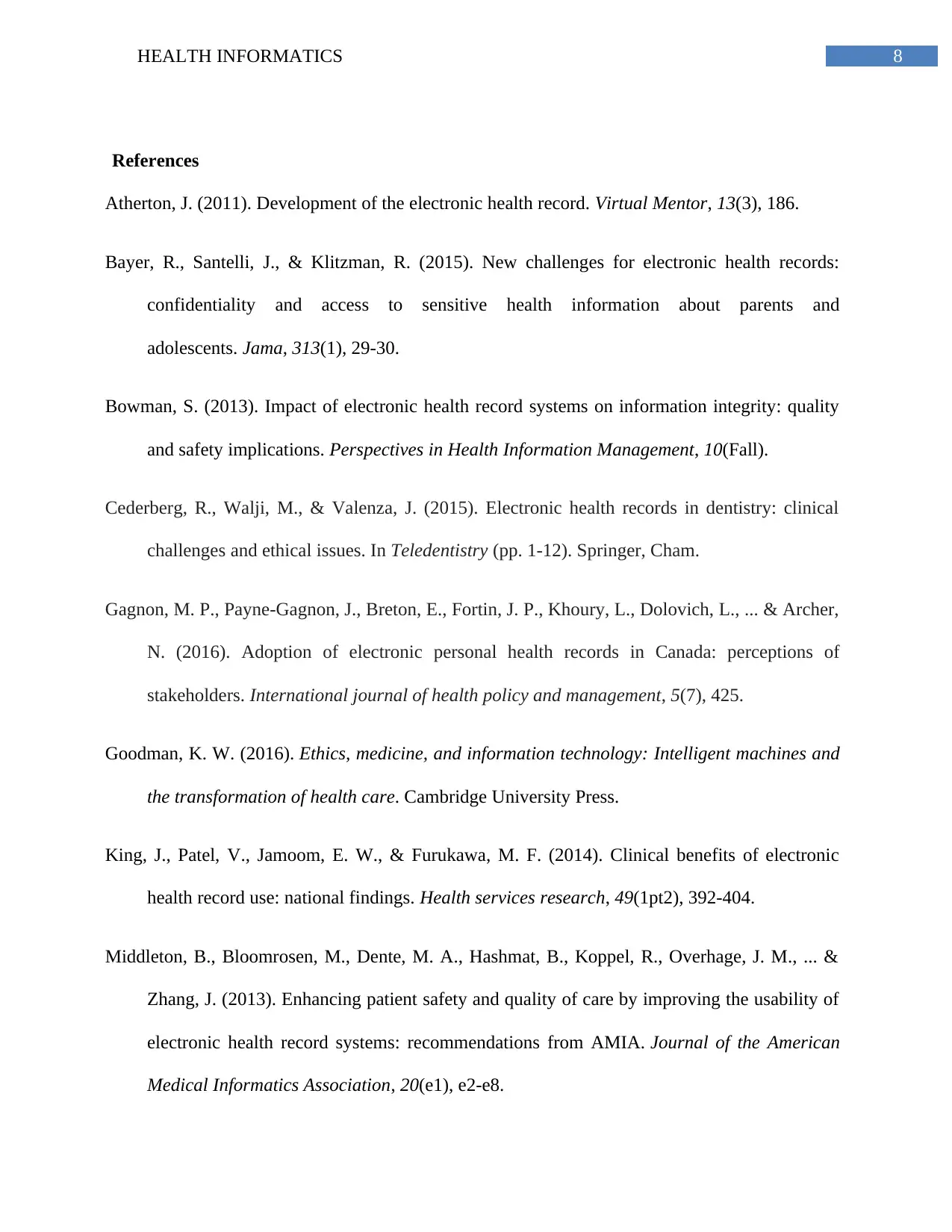
8HEALTH INFORMATICS
References
Atherton, J. (2011). Development of the electronic health record. Virtual Mentor, 13(3), 186.
Bayer, R., Santelli, J., & Klitzman, R. (2015). New challenges for electronic health records:
confidentiality and access to sensitive health information about parents and
adolescents. Jama, 313(1), 29-30.
Bowman, S. (2013). Impact of electronic health record systems on information integrity: quality
and safety implications. Perspectives in Health Information Management, 10(Fall).
Cederberg, R., Walji, M., & Valenza, J. (2015). Electronic health records in dentistry: clinical
challenges and ethical issues. In Teledentistry (pp. 1-12). Springer, Cham.
Gagnon, M. P., Payne-Gagnon, J., Breton, E., Fortin, J. P., Khoury, L., Dolovich, L., ... & Archer,
N. (2016). Adoption of electronic personal health records in Canada: perceptions of
stakeholders. International journal of health policy and management, 5(7), 425.
Goodman, K. W. (2016). Ethics, medicine, and information technology: Intelligent machines and
the transformation of health care. Cambridge University Press.
King, J., Patel, V., Jamoom, E. W., & Furukawa, M. F. (2014). Clinical benefits of electronic
health record use: national findings. Health services research, 49(1pt2), 392-404.
Middleton, B., Bloomrosen, M., Dente, M. A., Hashmat, B., Koppel, R., Overhage, J. M., ... &
Zhang, J. (2013). Enhancing patient safety and quality of care by improving the usability of
electronic health record systems: recommendations from AMIA. Journal of the American
Medical Informatics Association, 20(e1), e2-e8.
References
Atherton, J. (2011). Development of the electronic health record. Virtual Mentor, 13(3), 186.
Bayer, R., Santelli, J., & Klitzman, R. (2015). New challenges for electronic health records:
confidentiality and access to sensitive health information about parents and
adolescents. Jama, 313(1), 29-30.
Bowman, S. (2013). Impact of electronic health record systems on information integrity: quality
and safety implications. Perspectives in Health Information Management, 10(Fall).
Cederberg, R., Walji, M., & Valenza, J. (2015). Electronic health records in dentistry: clinical
challenges and ethical issues. In Teledentistry (pp. 1-12). Springer, Cham.
Gagnon, M. P., Payne-Gagnon, J., Breton, E., Fortin, J. P., Khoury, L., Dolovich, L., ... & Archer,
N. (2016). Adoption of electronic personal health records in Canada: perceptions of
stakeholders. International journal of health policy and management, 5(7), 425.
Goodman, K. W. (2016). Ethics, medicine, and information technology: Intelligent machines and
the transformation of health care. Cambridge University Press.
King, J., Patel, V., Jamoom, E. W., & Furukawa, M. F. (2014). Clinical benefits of electronic
health record use: national findings. Health services research, 49(1pt2), 392-404.
Middleton, B., Bloomrosen, M., Dente, M. A., Hashmat, B., Koppel, R., Overhage, J. M., ... &
Zhang, J. (2013). Enhancing patient safety and quality of care by improving the usability of
electronic health record systems: recommendations from AMIA. Journal of the American
Medical Informatics Association, 20(e1), e2-e8.
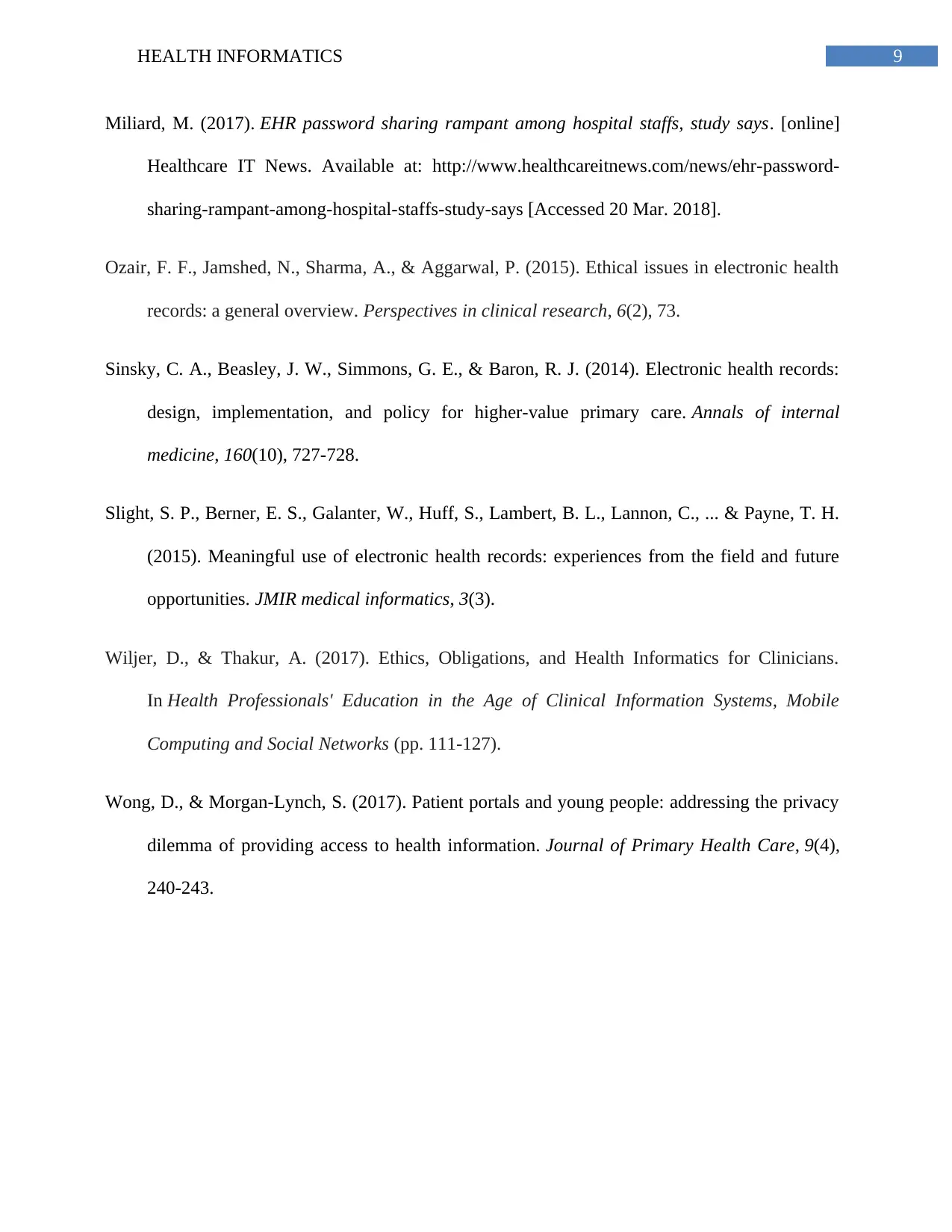
9HEALTH INFORMATICS
Miliard, M. (2017). EHR password sharing rampant among hospital staffs, study says. [online]
Healthcare IT News. Available at: http://www.healthcareitnews.com/news/ehr-password-
sharing-rampant-among-hospital-staffs-study-says [Accessed 20 Mar. 2018].
Ozair, F. F., Jamshed, N., Sharma, A., & Aggarwal, P. (2015). Ethical issues in electronic health
records: a general overview. Perspectives in clinical research, 6(2), 73.
Sinsky, C. A., Beasley, J. W., Simmons, G. E., & Baron, R. J. (2014). Electronic health records:
design, implementation, and policy for higher-value primary care. Annals of internal
medicine, 160(10), 727-728.
Slight, S. P., Berner, E. S., Galanter, W., Huff, S., Lambert, B. L., Lannon, C., ... & Payne, T. H.
(2015). Meaningful use of electronic health records: experiences from the field and future
opportunities. JMIR medical informatics, 3(3).
Wiljer, D., & Thakur, A. (2017). Ethics, Obligations, and Health Informatics for Clinicians.
In Health Professionals' Education in the Age of Clinical Information Systems, Mobile
Computing and Social Networks (pp. 111-127).
Wong, D., & Morgan-Lynch, S. (2017). Patient portals and young people: addressing the privacy
dilemma of providing access to health information. Journal of Primary Health Care, 9(4),
240-243.
Miliard, M. (2017). EHR password sharing rampant among hospital staffs, study says. [online]
Healthcare IT News. Available at: http://www.healthcareitnews.com/news/ehr-password-
sharing-rampant-among-hospital-staffs-study-says [Accessed 20 Mar. 2018].
Ozair, F. F., Jamshed, N., Sharma, A., & Aggarwal, P. (2015). Ethical issues in electronic health
records: a general overview. Perspectives in clinical research, 6(2), 73.
Sinsky, C. A., Beasley, J. W., Simmons, G. E., & Baron, R. J. (2014). Electronic health records:
design, implementation, and policy for higher-value primary care. Annals of internal
medicine, 160(10), 727-728.
Slight, S. P., Berner, E. S., Galanter, W., Huff, S., Lambert, B. L., Lannon, C., ... & Payne, T. H.
(2015). Meaningful use of electronic health records: experiences from the field and future
opportunities. JMIR medical informatics, 3(3).
Wiljer, D., & Thakur, A. (2017). Ethics, Obligations, and Health Informatics for Clinicians.
In Health Professionals' Education in the Age of Clinical Information Systems, Mobile
Computing and Social Networks (pp. 111-127).
Wong, D., & Morgan-Lynch, S. (2017). Patient portals and young people: addressing the privacy
dilemma of providing access to health information. Journal of Primary Health Care, 9(4),
240-243.
1 out of 10
Related Documents
Your All-in-One AI-Powered Toolkit for Academic Success.
+13062052269
info@desklib.com
Available 24*7 on WhatsApp / Email
![[object Object]](/_next/static/media/star-bottom.7253800d.svg)
Unlock your academic potential
© 2024 | Zucol Services PVT LTD | All rights reserved.





